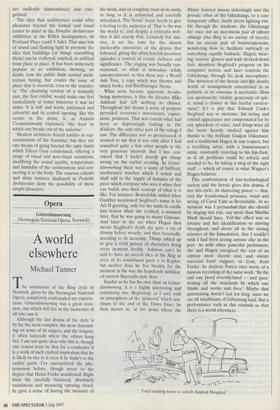Opera
Gotterchimmerung (Norwegian National Opera, Norwich)
A world elsewhere
Michael Tanner
The conclusion of the Ring cycle in Norwich, given by the Norwegian National Opera, completely confounded my expecta- tions. Gottercliimmening was a great occa- sion, one which will live in the memories of all who saw it.
Although the last drama of the cycle is by far the most complex, the most demand- ing on some of its singers, and the longest, it often succeeds where the others hang fire. I am not quite clear why this is, though one reason must be that for a conductor it is a work of such exalted inspiration that he is likely to rise to it even if he hadn't to the earlier parts. I've encountered the phe- nomenon before, though never to the degree that Heinz Fricke manifested. Right from the carefully balanced, absolutely unanimous and menacing opening chord, he gave a sense of having the measure of the work, and of complete trust in its unity. so long as it is unhurried and carefully articulated. The Norns' scene needs to give a feeling to the audience of That is the way the world is', and despite a contralto wob- bler it did exactly that. Leisurely but inci- sive, it set the tone for the almost intolerable intensities of the drama that followed, giving the often hateful mundane episodes a context of cosmic richness and significance. The staging was broadly con- ventional, or what is nowadays wildly unconventional, in that there was a World Ash Tree, a rope which was thrown and which broke, and BOcklinesque Norns.
What soon became apparent, besides being mysterious, is that the director Mike Ashman had left nothing to chance. Throughout this drama a sense of purpose pervaded everyone's movements, expres- sions, positions. That was exactly what had been so depressingly lacking in Die Walkiire, the only other part of the trilogy I saw. The difference was so pronounced. it seemed to me that it was only after I had consulted quite a few other people in the very generous intervals that I was con- vinced that I hadn't merely got things wrong on the earlier evening. In Getter- diimmerung there was a score of brilliant. unobtrusive touches which I noted and shall add to the supply of features of the piece which everyone who sees it when they can builds into their concept of what it is like. For instance: Brtinnhilde smiled when Gunther mentioned Siegfried's name in his Act H greeting, only for the smile to curdle into horror when she realised, a moment later, that he was going to marry Gutrune. And later in the act when Hagen first moots Siegfried's death she gave a cry of dismay before wearily, and then frenziedly, acceding to its necessity. Things added up to give a vivid picture of characters living every moment freshly. Ashman can't be said to have an overall idea of the Ring or even of its constituent parts a la Kupfer. but neither does he live blankly for the moment in the way the hopelessly debilitat- ed current Bayreuth cycle does.
Insofar as he has his own slant on GOtter- dammening, it is a highly interesting and convincing one. Beginning, as I said, with an atmosphere of the 'primeval' which con- tinues to the end of the Dawn Duet. he then moves us, at the point where the
Rhine Journey moves sickeningly into the prosaic ethos of the Gibichungs, to a con- temporary office, harsh street lighting visi- ble through the windows, the Gibichungs for once not an incestuous pair of inborn siblings (the Ring is no enemy of incest), but an uneasy pair of businesspersons, wondering how to facilitate outreach or something equally barbaric. Hagen, wear- ing 'serious' glasses and with sleeked-down hair, monitors Siegfried's progress on his computer screen, and later controls the Gibichungs through his desk microphone. The intrusion of the heroic intOlhe deadly world of management consultancy is as pathetic as its outcome is inevitable. How can spontaneity, vitality, generosity of spir- it, stand a chance in this fearful environ- ment? It's a pity that Edward Cook's Siegfried was so moronic, his acting and rotund appearance not compensated for by any splendour of voice. And things were all the more heavily stacked against him thanks to the brilliant Gudjon Oskarsson, not a traditional Hagen in any respect, but a terrifying actor, with a businessman's smile, constantly resorting to his hip-flask, as if all problems could be solved, and needed to be, by taking a swig of the right stuff - which of course is what Wagner's Hagen believes.
This confrontation of late-technological society and the heroic gives this drama, if not this cycle, its shattering power — that, and the transformed presence, vocal and acting, of Carol Yahr as Briinnhilde. At no moment was I persuaded, that she should be singing this role, any more than Martha Mtidl should have. Yet the effect was so intense and her identification so moving throughout, and above all in the closing minutes of the Immolation, that I couldn't wish I had been seeing anyone else in the part. As with other powerful performers, she and Hagen energised the rest of an anyway most decent cast, and always received loyal support, at least, from Fricke. As Andrew Porter once wrote of a famous recording of the same work: 'By the end one [was] overwhelmed — and ques- tioning all the standards by which one thinks and works and lives.' Maybe that questioning doesn't last for long, since we are all inhabitants of Gibichung-land. But a performance such as this reminds us that there is a world elsewhere.
'I was rushing home to watch Animal Hospital.' .


























































 Previous page
Previous page